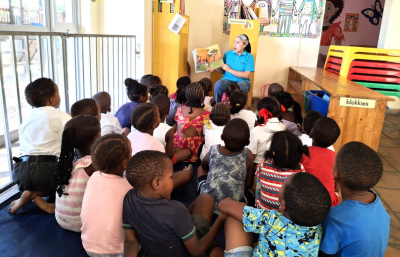Butterfly House also addresses issues of health and nutrition—areas where many families struggle. Through its partnership with the hospice and local health services, children receive education on common conditions, and screenings for vision, hearing, oral hygiene and nutrition.
“Some children arrive with untreated infections or dental problems. Many are undernourished,” Helga says. “We do what we can to make sure they’re healthy enough to learn and thrive.”
Each ECD child receives breakfast, snacks, and a warm lunch every day and a cooked meal is provided for the children attending the afternoon programmes. In extreme cases, extra food is provided for families.
Supporting Families, Building Community
Parents or guardians apply each October for their children to attend. Butterfly House prioritises those most in need, based on household income and family circumstances.
The centre doesn’t just support children, it also works with families. Monthly parent workshops focus on practical topics like child development, substance abuse, and positive parenting. Over time, this outreach has helped build trust and encourages more parents to ask for help when they need it.
“We try to meet families where they are,” Helga says. “It’s about walking the journey with them, not for them.”
A Place to Learn and Belong
The aftercare programme supports over 200 school-aged children. Primary learners attend in the afternoons, and high school learners come in the evenings. Sessions include homework help, life skills education, and open conversations about challenges such as peer pressure, safety, and healthy relationships.
To encourage positive behaviour, the centre runs a simple but effective reward system. Children earn points for kindness, helpfulness, and taking responsibility as well as attendance. These points are exchanged for donated items like toiletries, school supplies, clothing—and most often, food.
Despite the challenges, success stories are growing. Two former Butterfly House students are now attending the University of the Western Cape, and four others are at college. Their achievements reflect the long-term impact of early care and encouragement.
Helga’s Reflection
“This work can be tough, but it’s worth it,” Helga says. “We might not be able to change everything at home, but we can make sure that, for part of the day, children feel valued, heard, and safe.”
On World Social Work Day, the children surprised her with handwritten notes of thanks. “I keep them close,” she says. “They remind me of the difference we’re making.”
About Butterfly House:
- Founded by: Drakenstein Palliative Hospice during the HIV pandemic
- Funding: Department of Education (ECD), Department of Social Development, donations, local businesses and overseas funders
- Leadership: Elizabeth Scrimgeour CEO; Justine Goliath (Social Worker and Operations Manager); Helga Williams-Harris (Butterfly House Co-ordinator and Social Worker)
- Staff: 2 social workers, 1 social auxiliary worker, ECD educators and youth facilitators
- Volunteers: Assist with academic support, reading, creative activities, and more
- Capacity: 220 children in aftercare; 46 in ECD
- Services: ECD education and aftercare programmes focusing on academic support, social and professional skills and therapeutic programmes. The pillars of change are health and wellness, safety and security, personal capacity development, education and health literacy.
- Needs: Reliable funding, stronger government support, food and hygiene donations
- Who can help: Donors, healthcare professionals, volunteers, child advocates, the community, business CSI programmes




